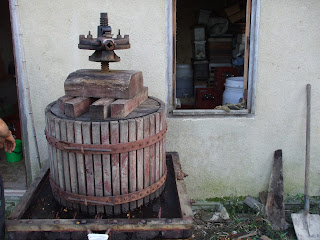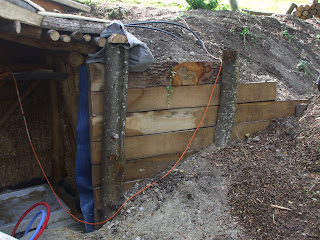During the last few years I have discussed countless projects and possibilities with people, all of whom have done a few of these things. Whether it be pizza and bread making, cultivating fruit, keeping bees, building with local materials, renovating old buildings, making a bread oven, drying fruit and vegetables, keeping poultry and sheep, working wood, mending mechanical things such as rotavators, bicycles, food processors and motorbikes, recycling and re-utilising discarded objects, conserving fruit and vegetables, making juices, having solar heated water, dry toilets, composting, living in yurts and caravans, storing rain water, gardening organically on a large scale with traction animals, there have been many discussions, I have gleaned many ideas for the future and made countless notes on what to and not to do in many situations.
Now I find myself at a location that has or does all of these things, it is truly amazing. The amount of time and effort that has gone into these projects over the last twenty or so years has been incredible and the fruits of this labour are a joy to behold.
Up on a hill above the ancient town of Montbrun Bocage with a view that stretches as far as the Black Mountains in one direction and the high peaks of the pyrenees in the other, there is an ancient farmhouse called “Beauregard’ and it is there that I am staying and discovering all these things.
It is the last location on our list for the summer that was decided back in June when Julian Vivien and I decided our summer route. It hadn’t been one of my favourite choices but it would allow us to spend some time in a new area to see if it would be a suitable place to look for land. Jean-Francoise had written back saying that he had decided on a project that would keep us busy for a couple of weeks if we were interested and we would be welcome. He proposed that we build a shelter for his donkeys and that was about it. So we added it to the list and arrived a week or so ago.
The family of four plus another four grown up children who come and go from time to time, plus another WWOOFer, Cecile are all really lovely people, welcoming, kind and of generous spirit in time, energy and soul. Day to day life is full of tasks, planned or otherwise and things move along at speed. With ten or so folk to feed there is always something needing harvested or chopped or peeled. Hens, ducks, sheep and donkeys to be fed and watered. Gardens to be tended to, crops to be harvested either for immediate consomation or to be preserved for future enjoyment. Bread to be made and of course our predetermined tasks in hand.
As a team we are progressing well with the framework for the stables, there isn’t a fully worked out plan so we consult every morning and discuss what the next steps are to be. So far we have made more mistakes that I care to mention, although, happily recoverable from and we haven’t had to waste any wood just yet. The errors come from miscommunication of ideas, changes of mind and further reflections that result in modifications for the future. All are taken in good humour and with an attitude of learning, discovery and the fact that we are only, in fact, building a shelter for some beasts, not a work of art. That said, we are paying attention to detail, trying to perfect techniques and do things to the best of our abilities, fully aware that in the not to distant future it may well be our houses that we are working on. (Well, I am anyway).
We work in the mornings, starting early, and then have the afternoons free to do whatever we wish to do. Explore the area, read or write, go for a walk, do nothing or else participate in whatever else is going on at the time. Cecile has different tasks and often works the afternoons, Jean-Francoise always has several additional tasks on the go, so there is always something new to get involved with and learn. For the evening meal there is a voluntary helping out with tasks which means that meals get prepared fast, eaten at a leisurely pace, often on the terrace overlooking the valley and tidied away without fuss or bother. It all works wonderfully and I am quietly content that I can now follow the gist of a good number of the conversations that go on during mealtimes.
the caravan where I sleep at night
solar food drier
the smartest duck shelter I have ever seen, we're going to
waterproof the roof next week with old hessian sacks and chalk render.
the dreaded asian hornet. the sting is intensely painful ( I know)
home constructed bread oven. made bread, pizzas for 20 people, cooked
meringues and dried figs and tomatoes from the garden
bakers tools
preparing to press apples on a grand scale
almost industrial
the big press in front of the honey and juice workshop!!
vines protected from the hornets and birds
another composting toilet
patiently waiting for their new quarters to be finished
the Sunday market at Montbrun Brocage






















































